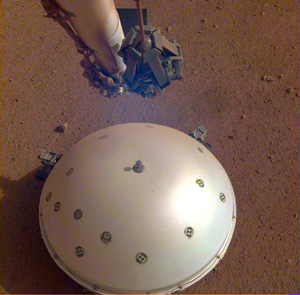
The National Committee for Space and Radio Science provides a regular update about international scientific unions and committees, news from the local scientific community, and information on relevant funding opportunities, conferences and awards. Importantly, the update is providing a way to keep the community informed on the progress of the decadal plan for space science, which is being prepared in 2019–20.
22 JULY 2019
The National Committee for Space and Radio Science is developing the next Decadal Plan for Australian Space Science 2020–2030. This will involve broad community consultation through a number of working groups, town hall meetings and other forums. Focus topics will include Australia’s present capability and capacity development; heliophysics and the solar system; space situational awareness and space weather; remote sensing and GNSS; space technology; space life sciences; and communications technologies. Input to the process is very welcome. Keep up to date with the consultation process via the National Committee website, following the consultation launch at the Australian Space Research Conference in September/October.
The EMCR Reference Group has been created to provide EMCRs the opportunity to be consulted for the Decadal Plan for Australian Space Science. All EMCRs interested in improving the space research environment in Australia are welcome to apply. The Expert Working Group has a strong commitment to diversity, equity and inclusion and will select new members with these principles in mind. We strongly encourage applicants from underrepresented minorities to apply.
Apply for the EMCR Reference Group
Applications close 31 July 2019
Get involved with the Women in Space Chapter of the National Space Society of Australia via its Facebook group, Slack channel ‘Women In Space – Australia’, and a soon-to-be established Twitter account. The WiSC aims to raise the profile of women involved with the Australian space sector, ensure that the needs of women in the Australian space sector are known, considered and represented, and facilitate discussion of broader matters of diversity and inclusion.
Submissions to RSL for the International Union of Radio Science (URSI) are now open. URSI Radio Science Letters (RSL) is a new electronic journal owned and operated by URSI. Its purpose is to publish original and previously unpublished scientific research work in all areas of radio science, in the form of short contributions that are rigorously reviewed. The journal is open access and will be published only in electronic format, one volume per calendar year.
Scientists and researchers are invited to submit papers and proposals for sessions (that may include both invited and contributed papers), workshops and short courses to the XXXIII General Assembly and Scientific Symposium of the International Union of Radio Science. The event will be held at Sapienza University Campus, Rome, Italy from 29 August to 5 September 2020.
Paper submissions open 15 October 2019 and close 31 January 2020
Nominations for the COSPAR awards are now open. The 43rd COSPAR Scientific Assembly will be held in Sydney, Australia on 15-23 August 2020. More information about awards and the nomination process can be found on their website.
Nominations close on 30 November 2019.
Applications for the WDS Data Stewardship Award are now open. The World Data System of the International Science Council supports long-term stewardship of quality-assured scientific data and data services across a range of disciplines in the natural and social sciences, and the humanities. This award highlights exceptional contributions to the improvement of scientific data stewardship by early career researchers through their engagement with the community, academic achievements, and innovations.
Nominations close 29 July 2019
Australia’s first joint space science and space industry conference, incorporating the 8th Space Forum (formerly South Australia Space Forum) and the 19th Australian Space Research Conference (ASRC), will be held on 30 September to 2 October 2019 in Adelaide. The Forum has a strong industry focus while the ASRC is aimed at space science and technology researchers. Abstracts for the ASRC are due by 22 July, the same day that registrations open.
The ASRC is jointly sponsored and organised by the National Space Society of Australia and the National Committee for Space and Radio Science, which is convened by the Australian Academy of Science. It is intended to be the primary annual meeting for Australian research relating to space research.
Early-bird registration closes 30 August 2019
The Australian Space Agency is a newly established agency within the federal Department of Industry, Innovation and Science. The Australian Space Agency will transform and grow a globally respected Australian space industry. This will boost the broader economy, inspire and improve the lives of Australians and be underpinned by strong international and national engagement. Sign up to receive updates from the Australian Space Agency.

NASA InSight mission touched down on Mars on 26 November in Elysium Planitia (4.5N,135.6E). InSight aims to provide direct measurements of Mars’s subsurface temperature and heat flow, crustal seismic vibrations, and a range of other parameters crucial for developing our understanding of the deep interior of the planet. Just 128 Martian days (sols) into the mission the first likely seismic marsquake has been detected. NASA’s InSight mission has several Australian participants, including Dr Katarina Miljkovic and Professor Phil Bland, both from Curtin University.
The Australian Space Agency released its 10-year strategy, Advancing Space, in April. The strategy is built around four strategic pillars and focuses activities on seven national civil space priorities: position, navigation and timing; Earth observation; communication technologies and services; space situational awareness and debris monitoring; leapfrog R&D; robotics and automation; and access to space. CSIRO released its Space Roadmap at the Australian Space Research Conference in September 2018.
Funding for a new smart satellites Cooperative Research Centre was announced in April. The SmartSat CRC is supported by $110 million in cash from industry participants and government, and another $130 million+ in-kind. Based in Adelaide, the CRC brings together a consortium of industry and research organisations with a focus to drive new space-related industries and strengthen national defence and security.
© 2025 Australian Academy of Science